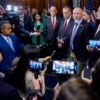Eight out of 10 voters say the national debt should be a top priority for the President and Congress, according to a new poll from the Peter G. Peterson Foundation. Yet, voters would be hard pressed to find much mention of the growing debt problem in the news these days.
One reason for this is the suspension of the debt ceiling last winter. Lawmakers feel little urgency to address a problem that’s been pushed off the agenda until next year.
On February 12, 2014, Congress suspended the debt limit for more than a year, until March 15, 2015. The Heritage Foundation’s Grover M. Hermann Fellow in federal budgetary affairs Romina Boccia writes, “When Congress suspended the debt limit, it did not limit the Treasury’s borrowing at all…. This is like Congress handing the executive a blank check with an expiration date. The blank check authorizes the Treasury to borrow as much as needed.”
She also notes that this is a fundamental concern because Congress “effectively abdicates its constitutional power to control the borrowing of the federal government.”
The removal of a limit on the debt is concerning. The national debt already looms large at $17.5 trillion and is on a dangerous upward path. While many recent reports have noted that this year’s deficit has slightly decreased, it is still adding to the debt.
Moreover, annual deficits are scheduled to grow in the coming years. The Congressional Budget Office also recently announced that it could no longer estimate the long-term spending costs of Obamacare.
Two-thirds of current government spending, mainly entitlement spending, is growing on autopilot. This spending (along with interest) is projected to exceed revenues by 2030. While the federal budget writ large is bloated and needs trimming, entitlement spending is the key driver of future federal spending and debt.
However, even though entitlement spending constitutes a majority of federal spending, it hasn’t been incorporated into this year’s budget debate. As Boccia explains, “Congress has placed two-thirds of the budget on autopilot, and this share is rapidly growing.”
Congress should put the budget on a path to balance and set an actual debt limit to stop the rising tide of spending and debt. Congress should also take the entitlements off autopilot to incorporate the key driver of spending in budget debates and create the impetus to adopt reforms to prevent a future fiscal calamity.
Caleb Zimmick is currently a member of the Young Leaders Program at The Heritage Foundation. For more information on interning at Heritage, please click here.
































